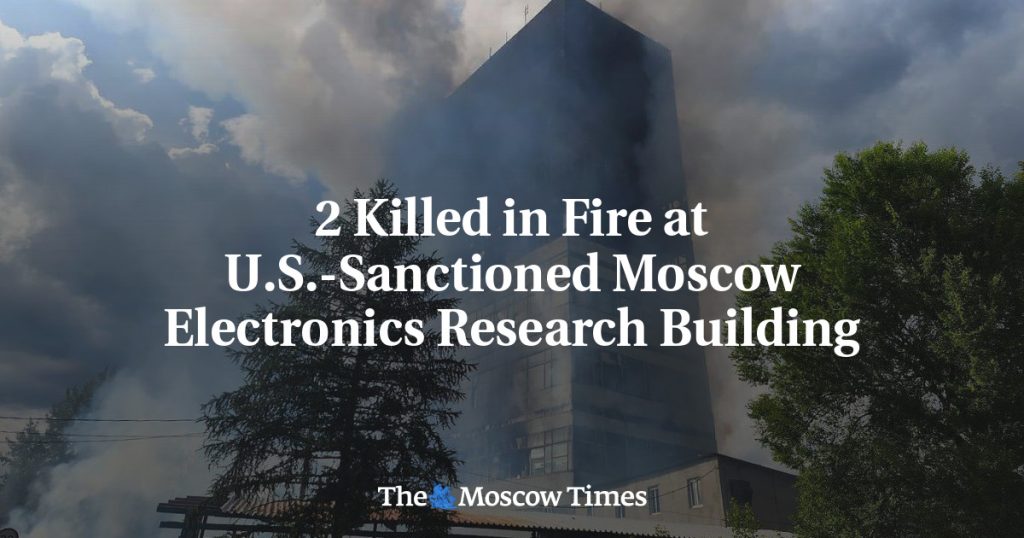A major fire broke out at a building linked to a Western-sanctioned scientific research institute in the Moscow region, resulting in at least two deaths. The Platan research institute, known for producing defense electronics, has been under U.S. sanctions since June 2022. Moscow region Governor confirmed the casualties and revealed that one person was evacuated in critical condition, while seven others were feared to be trapped inside. Emergency services lost contact with six individuals in the building, leading to a criminal case being opened for death by negligence. Anonymous sources suggested that the victims had jumped from the building to escape the blaze.
Reports from Russia’s Emergency Situations Ministry indicated that the fire had consumed several floors of the nine-story building, affecting an area of 4,500 square meters. Roselectronica, the electronics components producer under Rostec, clarified that the Platan research institute had not operated in the burning building since the 1990s when it became private property. Most of the building’s premises were leased to various tenants like recording studios, shops, and construction companies. It was speculated that the fire might have originated in one of the rented spaces. TASS news agency quoted an employee from Expresstechservice, a company with a sixth-floor office in the building, claiming to have witnessed the fire’s start, although this account could not be verified independently.
Efforts to control the fire and rescue any remaining trapped individuals continued as emergency services struggled to contain the flames. The loss of contact with those inside the building raised concerns, with investigators launching a criminal investigation into the deaths caused by negligence. The tragic incident shed light on the dangers posed by fires in industrial and research facilities, particularly those involved in defense-related activities. The impact of the fire on ongoing operations and research at the Platan research institute remains to be seen, as authorities strive to manage the aftermath and investigate the causes of the blaze.
The fatal fire at the Platan research institute underscored the risks faced by personnel working in sensitive research and industrial facilities. The Western sanctions imposed on the institute accentuated the geopolitical context in which the incident occurred, adding complexity to the aftermath and investigation. The involvement of government agencies, emergency services, and private entities in responding to the fire highlighted the need for coordinated efforts in managing such crises. The tragic loss of lives and potential disruptions to operations at the institute and the surrounding businesses called for a thorough review of safety protocols and emergency preparedness measures to prevent future accidents.
As investigations into the fire at the Platan research institute continue, questions about the circumstances leading to the blaze and the response of authorities and tenants are likely to arise. The use of leased premises for various commercial activities could raise concerns about regulatory oversight and compliance with safety standards. The impact of the fire on the local community, businesses renting space in the building, and the reputation of the institute itself could have far-reaching consequences. Efforts to address the immediate needs of the affected individuals, ensure the safety of remaining occupants, and prevent similar incidents in the future will require close collaboration between government agencies, private companies, and the community at large.
The aftermath of the fire at the Platan research institute serves as a reminder of the importance of effective emergency response mechanisms and proactive safety measures in mitigating risks in industrial and research settings. The tragic loss of lives and the extensive damage caused by the blaze underscore the need for continued vigilance and preparedness in dealing with such emergencies. As authorities work to determine the cause of the fire and hold responsible parties accountable, lessons learned from this incident can inform future policies and practices aimed at enhancing workplace safety and preventing accidents. The broader implications of the fire on the reputation of the facility, the stability of the surrounding businesses, and the overall security landscape highlight the need for sustained efforts to address safety concerns in critical infrastructure facilities.


